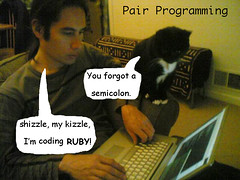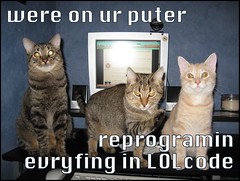I have been following the replies to my post on teaching programming in library school, and I have a confession to make before I continue:
I am horribly biased.
I’ve wanted to learn to program for a long time, and actually learning how to has really opened my eyes to so many possibilities. I’m now teaching myself PHP so I can learn to write my own WordPress plugins.
But I can understand this comment by Susannah M.:
Why would I want to learn any of these? What does “ruby” actually DO? what does “PHP” actually DO? How would I use these in my job? I’ve never even heard of these before. My computer does what I want it to do – why would I want to re-program it? Neither this entry nor the comments have explained this to me.
Dorothea Salo and Meredith Farkas blogged that programming isn’t what is needed, but better tech training in general. While I agree with this, I can attest that learning programming is a lot different from learning a lot of the other tech stuff. I’m lucky enough (and stubborn enough) to know a good amount about programming stuff. I run Linux at home (right now in fact) and I can accomplish a lot of things without understanding the programming involved.
Meredith said:
I’ve even done stuff with PHP and JavaScript, but it just involved messing around with stuff that already existed. I’d break it, figure out what I did and how it impacted things, and then fix it. Eventually I’d usually get it to do what I needed it to do.
This description really sounds familiar. I have managed to do a LOT without knowing a lick of programming, and I can attest that it is indeed possible. At the same time, I wish, oh I wish, that I had learned to program back in high school. I would have saved myself perhaps hundreds (if not more) of hours doing things that could have been accomplished much quicker if I actually knew how things worked.
But here’s the deal: programming is hard. Especially starting out. (Trevor Owens noted this as well.) I’m finding the second language easier to pick up because I can carry things over from the first language. But I honestly don’t know if I could have figured it out without a fantastic teacher that took the time to put things into context and explain things. It is all about context. Simply requiring library students to take a computer science course won’t do it. What library schools need are more library centered tech courses—like Dorothea’s and Meredith’s—that put technology in the context of librarianship.
One other point that has been rambling around my brain in the last week is how different library school student goals may be. What I think of librarianship—active and participatory maintenance and stewardship of information—isn’t everyone’s reason for going to library school. I suppose my definition leans toward the ‘information’ area of library school. In any case, I would urge anyone interested in information management/maintenance/finding in general to find a way to learn to program. It will change the way you think about computers.
And, it’s fun—if you’re the type that likes puzzles and brain teasers. :)



As a librarian who’s been using Linux since 1994, has tried to “learn programming” beyond simple bash scripts, and has had the most luck with Ruby, I’m mostly in agreement with you. It’s hard work, but more annoyingly, it takes *time* — time enough that I’ve considered off-and-on taking all my vacation for a year and locking myself in a small, featureless room with a single stripped down computer loaded only with vi and ruby.
But yeah, there’s *definitely* a need for more tech-centered library school programs. As it is now, the education is very basic; logically so, as library schools have to accept people of widely varying tech skills. But I can’t help but think that people who think that their computer does everything they want it to do aren’t really trying very hard, or thinking very broadly.
I’m a programmer, not a librarian, and I’m about to expose my own biases: I don’t think programming should be taught in library school.
Instead, everyone should pass a rudimentary programming class as a requisite for getting a high school diploma.
“Programming” is not about bending a computer to one’s will, though that is a useful side-effect. “Programming” is about learning to think rigorously, and describe solutions to problems in a formal way.
The late pioneer of computer science, Edsgar Dijkstra famously said, computer science is about computers they way astronomy is about telescopes. I think that’s true – he was much smarter than I am, so who am I to argue? – and I think people in general would benefit from the skills gained in learning a little bit about “programming”.
Michael’s voicing the view of the 1983 “A Nation at Risk” report, which proposed computer science (okay, 1983 version) as a “fifth basic” in HS. My university’s computer-science department doesn’t teach languages other than C+, not because they’re useless but because they change so rapidly. That leads to a chicken-and-egg phenomenon: who’s responsible for teaching the current “stuff”? Few places teach how to use Microsoft Word, but a computer language is a bit more complicated.
I learned PASCAL in a summer course in college, but that was before object-oriented languages, and PASCAL was perfect for teaching structured programming in a procedural language. I’m not sure how it’s done now… but I don’t think library programs should ignore it.